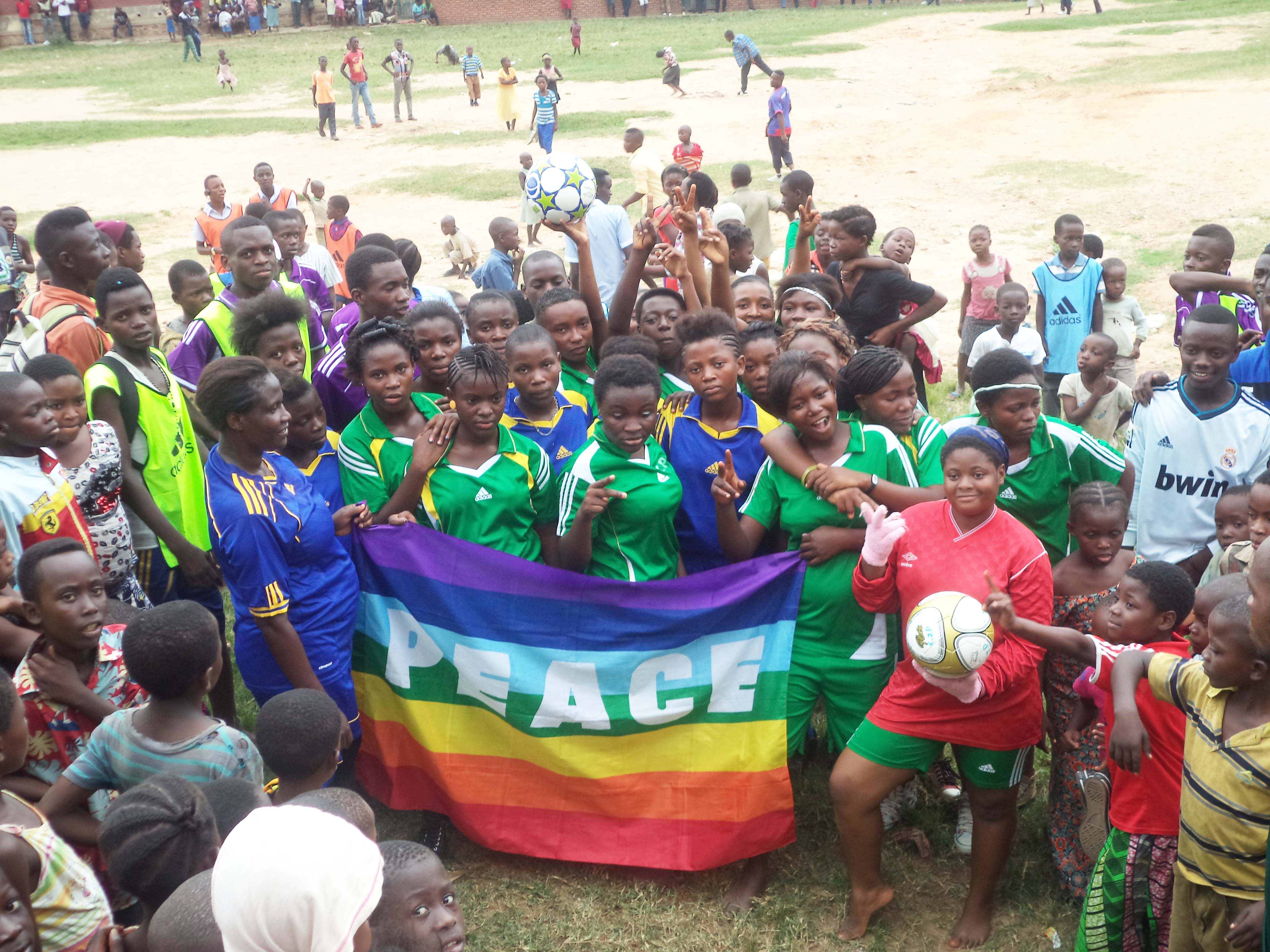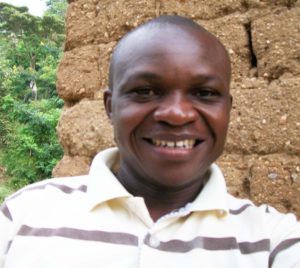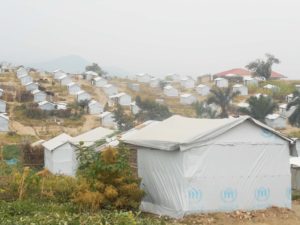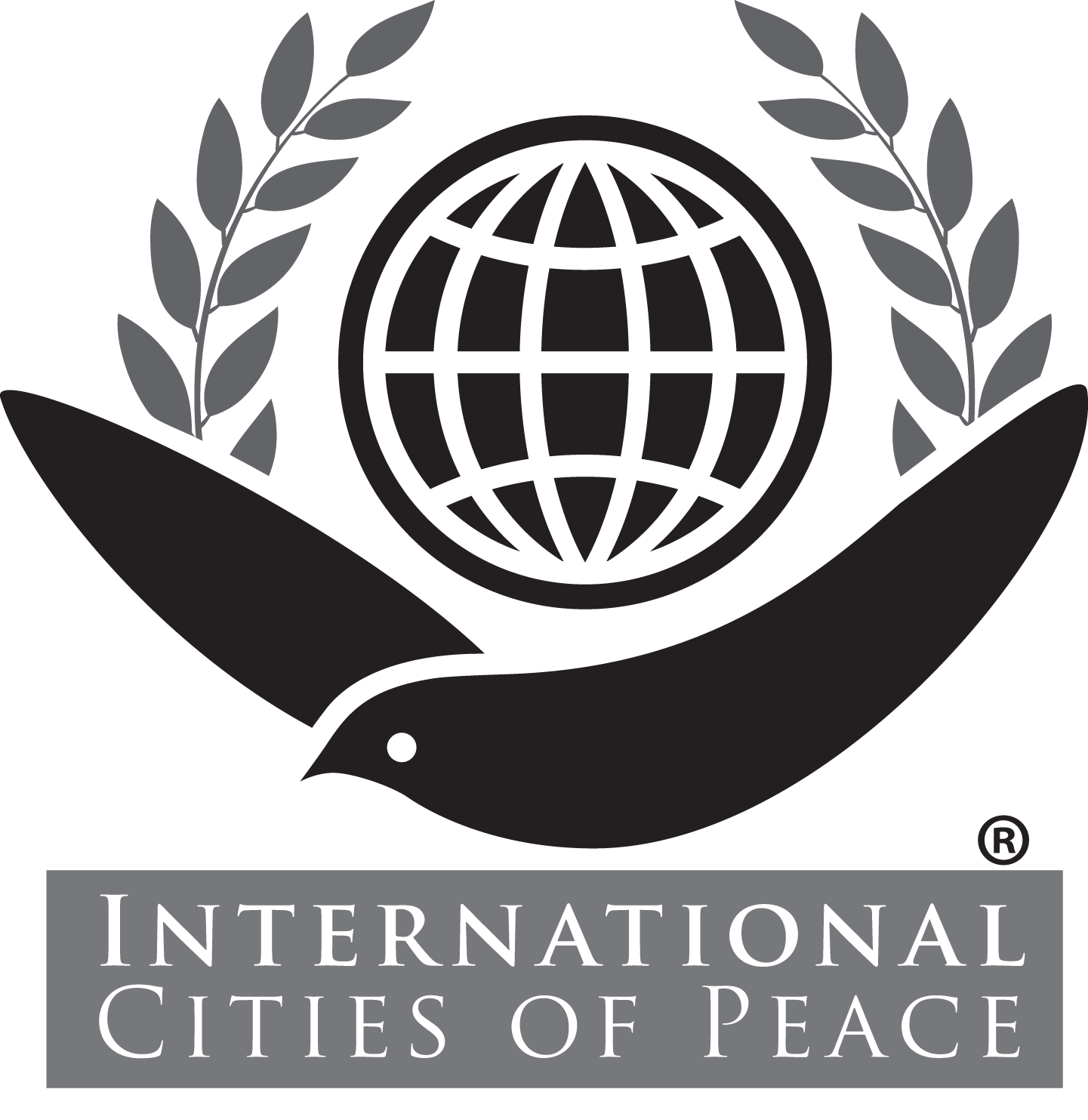South Kiva, Democratic Republic of Congo: City of Peace
Welcome to Jean Paul Elongo and his colleagues who have established South Kivu as a city of peace. The group has created the Centre Des Jeunes Pour La Paix to help young people, including 130 orphans, with school fees and other necessities of life. The group has many activities that help communities divided by the conflict, including Banyamulenge, Bembe, Fuliru, Lega, Tshi, Vira, and others in the South Kivu region.
Note: Introduction page with information primarily at the time of joining International Cities of Peace. For updates, please contact the liaison.
THE CENRE DES JEUNES POUR LA PAIX
Centre des Jeunes pour la Paix provides school fees and materials (notebooks, pens, pencils, etc.) for children affected by conflict in the Ruzizi plain. At least 130 children including: orphans, former child soldiers, disabled children, separated from their families, refugees, etc. receive school fees and materials.
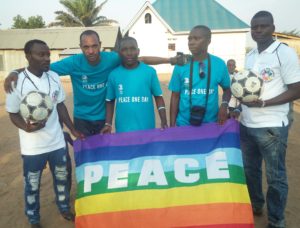
Every September 21, Centre des Jeunes pour la Paix organises a World Day of Peace. Girls and boys from different communities in conflict play football tournaments and festivals that promote peace, tolerance and peaceful coexistence in South Kivu.
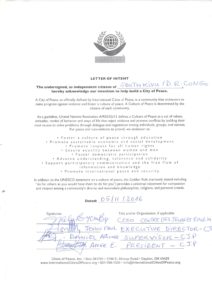
Letter of Intent
VISION
We dream of “a world where the values of brotherhood, solidarity, tolerance and responsibility would have a much higher importance than money, material wealth and social position.
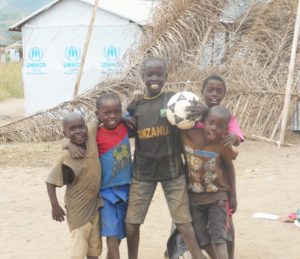
Football tournaments bring together more than 3,500 young people ages 6 to 25 years of age from many communities divided by the conflict, including Banyamulenge, Bembe, Fuliru, Lega, Tshi, Vira, and others in the South Kivu region.
MISSION
Tto unite, educate and inspire young people and children to overcome the effects of poverty and conflict in communities and to address the consequences of war. Boys and girls ages 6 to 24 participate in educational activities and regular football and whole communities are involved in tournaments for peace promoting tolerance between groups previously in conflict.
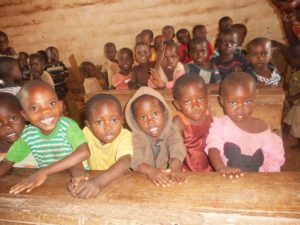
Playdégogie is the support methodology aimed at children 6 to 12 years. At school and in the refugee camps, this approach allows children to learn and grow by practicing sports games. The playdagogiques activities enable them to acquire knowledge by spending and having fun:
· Knowledge on a dedicated theme (nutrition / obesity, health, discrimination, disability, environment, etc.);
· The life skills (self-respect, rules, collaboration, etc.)
· Behavioral reflexes positively affecting their life course or those of their family members
PROGRAMS AND ACTIVITIES
a) Championships / tournaments and football festivals for peace
The methodology used is the football:
Football adapts the classic game of football to help players apply what they learn in the field to their daily lives.
It is played in mixed teams (3 girls and 3 boys in each team) and incorporates three ‘halves’ pre-game agreement on the rules and values, a football game, and discussion post-match lessons learned.
In football, points are not only earned by scoring goals, but also through fair play and respect. As it is played without referees, it helps participants strengthen their communication skills and conflict resolution and to take responsibility for their own actions. This game will be modified to include questions about health problems for a goal to be accepted. Play in mixed teams is a different style of addressing gender.
b) International Day of Peace, 21 September
c) Protect and promote psychosocial well-being of children affected by armed conflict in post-conflict villages in the South Kivu region
d) Education of conflict victim children in post-conflict villages
a) Sport for peace in Lusenda Burundians refugees camp
ABOUT JEAN PAU ELONGO
Jean Paul Elongo was born on 11.11.1982 in the village of Nundu in Fizi territory in eastern Democratic Republic of Congo.
In 1990-1996, he did his primary education at the Catholic Primary School Munanira Uvira. In 1997, he left the country to seek refuge in Tanzania in the camp of Congolese refugees for 10 years where I got my degree in LAC commercial and technical Administrative.
In 2006, Jean Paul voluntarily returned to the country to continue his studies at the Higher Institute of Rural Development.
CONTACT INFO
For more information please contact:
Jean Paul <jean_paul72@yahoo.com>
ABOUT SOUTH KIVU, D.R. CONGO (from Wikipedia)
South Kivu is a province of the Democratic Republic of Congo. It borders the North Kivu province in the north, west Maniema and Tanganyika south. To the east, it borders Rwanda, Burundi and Tanzania. South Kivu province has three cities: Bukavu, capital of the province, Baraka and Uvira.
THE CONCEPT OF TERRITORY AND IDENTITY CONFLICTS OF BIRTH
The notion of territory is in most situations confused with the land.
The latter has a limited meaning and implies a much funds, ownership of land belonging to an individual, the land space developed and intended for agricultural production at large. This concept introduces the dimension of private ownership and state ownership. The scientific work that angle facing land disputes in terms of incompatibility of local land agreements or legal pluralism. Instead, we preferred the concept of territory that best explains the conflicts between ethnic groups. The land they argue are located on an inhabited territory, defined and dependent on state or jurisdiction.
This is the state or territory administered by a modern authority and governed by law. This design allows to lift the confusion between state territory and ethnic territory. It existed before colonization and was not well-defined and fixed. Geographically dispersed, ethnic territory was under the authority of a patriarch and was, according to Denis Retaillé, maximum solidarity spaces, exchange, movement and collective identity. This produced the Identity State in the words of Bertrand Badie.
Ethnic identity or territory refers to spaces in which people are the majority, the cradles of the past or spaces where a people is a minority and has the ambition to be connected between different ethnic pockets.
Tension rises to the Burundian refugee camp in Lusenda, South Kivu. Burundian Refugees. Faced with the presence of Burundian rebels of rumors in the camp, the Congolese National Police HAS set up a post in the camp, while MONUSCO Provides security around Lusenda. Purpose The Refugees do not see all this in a positive light Police presence. Several incidents already-have Occurred in the past. This is a delay in the delivery of food qui led to clashes.
Burundian refugees in the Lusenda camp in South Kivu in eastern DRC are living in total insecurity. When they demand their rights, they are the bullets whistling and the Congolese authorities say they exceeded this situation these Burundian refugees in distress. According to Burundian refugees in the camp Lusenda located in South Kivu province in eastern DRC, misfortunes never come alone.
Apart from the lack of food, diseases were erected in the camp for Burundian refugees. “Food is distributed with great delay and diseases become chronic. We did not even manage to get the drugs,” they say. When they claim their rights, they are intimidated by live ammunition. “In Burundi, we fled the balls every day and here it’s the same thing.” Three Burundian refugees were injured by bullets by Congolese police.”
DO YOU THINK YOUR COMMUNITY CAN BE A CITY OF PEACE? SEND AN EMAIL!
Note: If information or photos used here are copyrighted, please contact us and we will immediately delete the copyrighted material.
